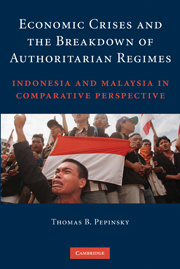Description
Economic Crises and the Breakdown of Authoritarian Regimes
Indonesia and Malaysia in Comparative Perspective
Author: Pepinsky Thomas B.
Thomas B. Pepinsky examines how coalitions and capital mobility in Indonesia and Malaysia shape the links between financial crises and regime change.
Language: English
Subject for Economic Crises and the Breakdown of Authoritarian Regimes:
Approximative price 55.08 €
Subject to availability at the publisher.
Add to cart
Economic crises and the breakdown of authoritarian regimes: indonesia and malaysia in comparative perspective
Publication date: 08-2009
344 p. · 15.9x23.4 cm · Hardback
Publication date: 08-2009
344 p. · 15.9x23.4 cm · Hardback
Approximative price 35.19 €
Subject to availability at the publisher.
Add to cart
Economic crises and the breakdown of authoritarian regimes: indonesia and malaysia in comparative perspective
Publication date: 08-2009
346 p. · 15x22.6 cm · Paperback
Publication date: 08-2009
346 p. · 15x22.6 cm · Paperback
Description
/li>Contents
/li>Biography
/li>
Why do some authoritarian regimes topple during financial crises, while others steer through financial crises relatively unscathed? In this book, Thomas B. Pepinsky uses the experiences of Indonesia and Malaysia and the analytical tools of open economy macroeconomics to answer this question. Focusing on the economic interests of authoritarian regimes' supporters, Pepinsky shows that differences in cross-border asset specificity produce dramatically different outcomes in regimes facing financial crises. When asset specificity divides supporters, as in Indonesia, they desire mutually incompatible adjustment policies, yielding incoherent adjustment policy followed by regime collapse. When coalitions are not divided by asset specificity, as in Malaysia, regimes adopt radical adjustment measures that enable them to survive financial crises. Combining rich qualitative evidence from Southeast Asia with cross-national time-series data and comparative case studies of Latin American autocracies, Pepinsky reveals the power of coalitions and capital mobility to explain how financial crises produce regime change.
1. Crises, adjustment, and transitions; 2. Coalitional sources of adjustment and regime survival; 3. Authoritarian support coalitions: comparing Indonesia and Malaysia; 4. Adjustment policy in Indonesia, June 1997–May 1998; 5. Adjustment policy in Malaysia, June 1997–December 1999; 6. Authoritarian breakdown in Indonesia; 7. Authoritarian stability in Malaysia; 8. Cross-national perspectives; 9. Conclusions.
Thomas B. Pepinsky is Assistant Professor of Government and a faculty affiliate of the Southeast Asia Program at Cornell University, New York. His research appears in World Politics, the European Journal of International Relations, the Journal of East Asian Studies, the Journal of Democracy, Studies in Comparative International Development, and several edited volumes. He received his PhD from Yale University and taught at the University of Colorado, Boulder from 2007 to 2008. He held a Fulbright–Hays Doctoral Dissertation Research Abroad fellowship in Indonesia and Malaysia from 2004 to 2005.
© 2024 LAVOISIER S.A.S.




